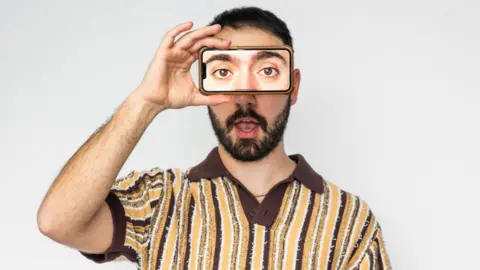No laughing matter - how AI is helping comedians write jokes
 Dahlia Katz
Dahlia Katz“Why did the politician bring a ladder to the debate? To make sure he could reach new heights with his promises!”
Ask AI to write a political joke, and the above is an example of what you can get.
Perhaps not funny enough to deliver on stage in front of a paying audience, but that doesn’t mean there is no room for AI in comedy.
Comedians are increasingly experimenting with the technology to write scripts and brainstorm ideas, including Anesti Danelis. Earlier this year, the Canadian asked popular AI chatbot ChatGPT to write him a show.
The result is what he has been performing throughout this summer, including at this month’s Edinburgh Festival Fringe.
The BBC sat down with Anesti after his sixth performance in seven days at the Toronto Fringe Theatre Festival in July. He explained the writing process behind his show “Artificially Intelligent”.
“I was playing around with ChatGPT, and the results it gave me were terribly hilarious, and I thought ‘maybe there's a show in this?’.”
Despite some rubbish jokes, he says the tool was useful for brainstorming.
“I asked it to ‘write me five songs about bisexual dilemmas’, or ‘being an immigrant child’, and it gave me ideas that I would have never thought of.”
What he wasn’t expecting from AI was its understanding of how to devise a show.
“I told it to make me a running order, and it explained where every song should go and why, and it made total sense. I was surprised by how much it could explain the reasoning behind it.”
Despite using the technology to write chunks of the script, Anesti’s show very much relies on his delivery. Throughout the performance the comedian switches from a keyboard to a guitar to deliver songs and monologues. There’s lots of interaction, including a serenading of an audience member, with a song written about them by ChatGPT.
Reflecting on the experience, Anesti says: "I learned through the process that human creativity can't be replicated or replaced, and in the end about 20% of the show was pure AI, and the other 80% was a mix.”
 Getty Images
Getty ImagesSo far, he says, he has only had good feedback from audience members, including Olivia Smith and Bethany Radford, who both live in Toronto.
Olivia admits she’s sceptical of AI, but enjoyed seeing it played with creatively.
“I think I'd feel a little cheated out of an experience if the entire thing was written by technology, but it was funny seeing AI on stage because it was creative,” she says.
Bethany, who is an actor, agrees, and says: “There is a place for AI in creation and writing so long as it’s transparent that it’s been part of the process.”
A recently released study from the University of Southern California found that AI-generated jokes outperform those crafted by human beings. Bethany, however, is not so sure, and feels “humans are pretty good at sniffing out AI”.
If she is watching something, she adds: “I feel like I know when the writing had no human involved. But I'm sure that will change as it gets smarter.”
Making audiences laugh is big business, and over the past decade the stand-up comedy market in the US has almost tripled in terms of the combined value of tickets sold. That is according to data from trade publication Pollstar, which monitors the live performance sector. It says US comedy ticket sales hit $900m (£700m) in 2023, up from $371m in 2012.
Meanwhile, a separate study last month said that live comedy was now worth more than £1bn a year to the UK economy. This figure includes not just ticket sales, but also the revenues of comedy venues and festivals, and the positive impact on the wider local economies.
US comedian Viv Ford is also performing at this month’s Edinburgh Festival Fringe.
Her show is called “No Kids On The Blockchain”, and details her time living with “14 tech-loving crypto [currency] bros in San Francisco”.
Though she wrote the show herself, she explains she tested her material on ChatGPT.
"I'll say, ‘hey, is this joke funny?’. And if it says ‘it’s funny’, genuinely, it does not land with an audience,” says Viv. “But if it says a joke ‘is offensive’ it does so well.
“And sometimes ChatGPT will say ‘the joke is fine, but could use some work’, in which case I toss it away and start again.”
Viv knows that lots of people won’t be so embracing of AI in the arts. It’s a view she used to take until she lived in San Francisco, where so many tech firms are based.
“I'm so aware that the only reason I think this way is because of my four-year indoctrination in the school of San Francisco,” she says. “I realised AI can be your weapon, just like Google can be your weapon. If you know how to use AI correctly, you are unstoppable.”
 Viv Ford
Viv FordNot everyone in the comedy world is keen to try AI though, including Kiwi-Filipino comedian James Roque. He says it doesn’t fit with his approach to humour.
“My belief and ethos is that the best comedy is the kind that is deeply human and vulnerable, and AI couldn’t do that,” he says.
Mr Roque is also performing at Edinburgh this month, and he thinks audiences will notice if other comedians use AI. “They can sniff out when something isn’t authentic,” he says.
“So if you haven’t created it, I think audiences are smart and emotionally intelligent enough to know something is off in the show.”
Could AI be the future of comedy? No one can be sure.
Despite writing the majority of his current show with AI, Anesti Danelis isn’t convinced he would do it again. He also has concerns for the next generation of comedians who might grow to rely on it.
“I think the dangerous thing about AI is that it can be a crutch,” he explains.
“If you’re an established comedian who knows your voice, AI gives good advice. But when you're a new comedian and you don't have that voice yet, you need to learn without AI.
"Otherwise, a generation of comedians will be saying the same repetitive, distilled stuff.”
